













|
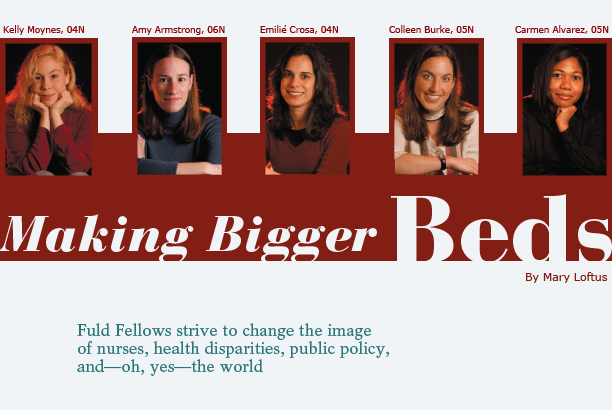 |
 |
 elly
Moynes, a sanguine 30-year-old who holds degrees in psychology and
Japanese, has taught English in Japan, volunteered with Amnesty
International, lived with Tibetan Buddhist nuns in exile in India,
and traveled through Cambodia, elly
Moynes, a sanguine 30-year-old who holds degrees in psychology and
Japanese, has taught English in Japan, volunteered with Amnesty
International, lived with Tibetan Buddhist nuns in exile in India,
and traveled through Cambodia,
Vietnam, and Thailand.
“I saw that health, clean water,
and plentiful food are the only important things,” she recalls.
“Something started to grow in me. I thought what a better
gift I could give if I had basic health care skills.”
But it was while working at the Outpatient
Psychiatric Clinic at Grady Memorial Hospital, intending to pursue
a PhD in psychology, that Moynes had an insight into what she really
wanted to do for her life’s work.
“A lot of nurses worked at the
clinic, and I saw the love and true connection they had with patients,”
she says. “Nurses are like the midwives of health.” |
 |
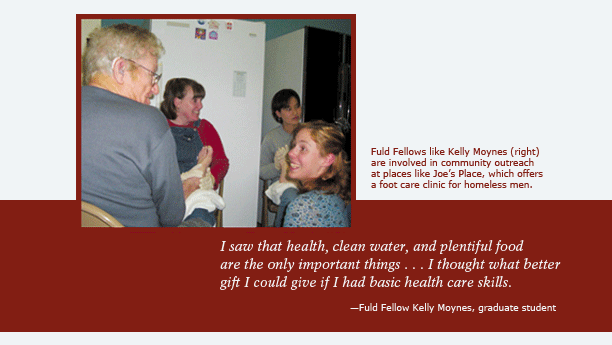 |
 |
Compelled
to serve
 oynes
is one of 12 fellows in the Fuld Fellowship Program, targeting second-career
students with a strong desire to lead and a special interest in
social responsibility and vulnerable populations. The program is
funded with $5 million from The Helene Fuld Health Trust—the
largest single gift in School of Nursing history.Fellowships provide
three years of study for students, who earn both bachelor’s
and master’s degrees in nursing. Fellows are enrolled in the
Emory Nursing Segue Program, a combined degree option for non-nurses
with degrees in other fields. oynes
is one of 12 fellows in the Fuld Fellowship Program, targeting second-career
students with a strong desire to lead and a special interest in
social responsibility and vulnerable populations. The program is
funded with $5 million from The Helene Fuld Health Trust—the
largest single gift in School of Nursing history.Fellowships provide
three years of study for students, who earn both bachelor’s
and master’s degrees in nursing. Fellows are enrolled in the
Emory Nursing Segue Program, a combined degree option for non-nurses
with degrees in other fields.
Moynes, who completed her BSN in 2004,
now works in the medical-surgical unit at Emory Crawford Long Hospital
on weekends and pursues her MSN during the week. She plans to be
a family nurse practitioner and midwife, and to devote her career
to reducing the gap in infant mortality rates between white and
black
newborns.
Like Moynes, Emilé Crosa began
the master’s portion of the program this past fall. All of
the fellows—including seven seniors and three juniors—have
bachelor’s degrees (and several, master’s degrees) in
disciplines ranging from microbiology to religion, and many have
had previous careers.
“The expectation,” says
Clinical Assistant Professor Ann Connor, the fellows’ faculty
mentor, “is that they’re going to change the profession
of nursing. They’re already changing the school. With the
diversity of their backgrounds, they are coloring the water in some
marvelous ways.”
What the fellows have in common, adds
Connor, is that “they’ve all come to the program with
a sense of social justice, social change. They share an inner turmoil
about issues of injustice and inequities surrounding health care.”
Outside one's comfort zone
 or
junior Amy Armstrong, the decision to return to nursing school came
after she had earned a bachelor’s degree in religion and ethics
from Smith College and a master’s degree in religion from
Harvard. or
junior Amy Armstrong, the decision to return to nursing school came
after she had earned a bachelor’s degree in religion and ethics
from Smith College and a master’s degree in religion from
Harvard.
“I always thought I would be
a professor of religion, and here I am in a school of nursing,”
says Armstrong, who plans to become a family nurse midwife, possibly
in rural Mississippi. “In my studies of religion, I explored
religious rituals and texts and developed a deeper understanding
of the complexities of human life. I was very much in my comfort
zone. But I became passionate about wanting to step outside of that,
to be on the practical side.”
One of the strengths of the Fuld Program
is its blending of academics and leadership training with hands-on
provision of health 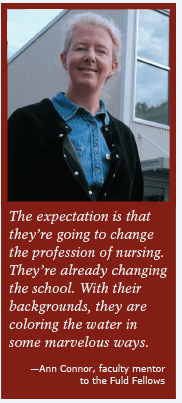 care
to the poor and disenfranchised, from inner-city residents to rural
migrant workers. care
to the poor and disenfranchised, from inner-city residents to rural
migrant workers.
Many of the fellows volunteer at
Café 458, a restaurant for the homeless, who can order meals
like vegetable lasagna and curried chicken from menus and are served
by volunteer waiters and waitresses at tables adorned with fresh
flowers. The innovative café, which provides both delicious
food and a sense of dignity to its patrons, was founded in 1988
by Connor’s husband, A.B. Short (Connor served as chair of
the board). The café took root in a renovated liquor store
by the King Center in downtown Atlanta. “Being
a mentor to the Fuld Fellows is a good fit for me,” says Connor,
“since I have spent most of my nursing career working with
those at themargins of society.”
Fellows are also involved with community
outreach activities, such as MedShare International, which collects
and recycles surplus medical supplies and equipment for distribution
to other countries; Joe’s Place, which offers a foot care
clinic for the homeless; Project Open Hand, which provides meals
and nutrition services to people with symptomatic HIV/AIDS, homebound
seniors, and others with critical illnesses or disabilities; and
the International Rescue Committee (IRC), a refugee resettlement
agency.
“Through the IRC, I was introduced
to a newly arrived family from Kabul, Afghanistan, and have developed
a strong relationship with the parents and their children,”
says Jordan Bell, a senior who intends to work in international
health. “I witnessed the birth of their fifth child at DeKalb
Medical Center and felt thankful to share that precious moment with
them.”
Service learning activities like these
are coordinated through the school’s Office of Service Learning,
and Fuld Fellows gain a global nursing perspective through involvement
with the Lillian Carter Center for International Nursing. They also
have traveled to Cuba, Mexico, the Bahamas, and Jamaica to study
health care systems abroad, and in 2003, Moynes and Crosa went to
Seoul, South Korea, on an Emory/Yonsei University exchange for three
weeks of cross-cultural study.
“We toured hospitals and community
health centers, and made a few home visits,” says Crosa. “Family
involvement is very important in Korean health care. Hospitals don’t
even supply meals—the patients’ families are expected
to do that. And they use a lot of Western and Eastern medical treatments
together, such as antibiotics and acupuncture.”
Closer to home, fellows have been
involved with the Farm Worker Family Health Program, which provides
services to migrant families in South Georgia for two weeks each
summer. Students who take part in the program gain firsthand experience
in conducting physical assessments on school children and counseling
and treating adults for a variety of health concerns. |
 |
 |
“We
saw a lot of dental problems, a lot of musculoskeletal problems,
and back pain from being bent over all day,” says senior Colleen
Burke, who plans to promote health in communities as a nurse practitioner.
One day, Burke and other fellows picked tomatoes to share the experience
of physical labor in the scorching sun. |
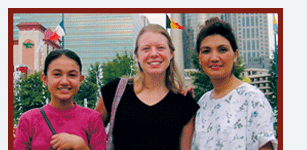 |
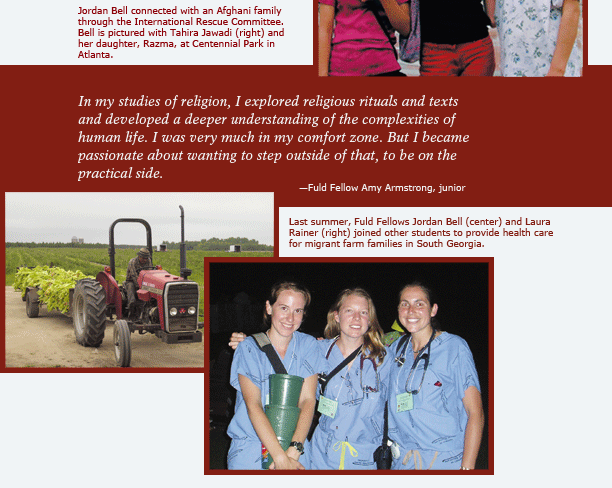 |
 |
Faith
in the Future
 hese
master’s-prepared students will re-enter their careers with
a deep working knowledge of health issues for vulnerable people
in the United States and internationally,” Dean Marla Salmon
wrote in a report to The Helene Fuld Health Trust, “coupled
with a strong sense of direction and mission for addressing these
problems realistically.” hese
master’s-prepared students will re-enter their careers with
a deep working knowledge of health issues for vulnerable people
in the United States and internationally,” Dean Marla Salmon
wrote in a report to The Helene Fuld Health Trust, “coupled
with a strong sense of direction and mission for addressing these
problems realistically.”
Fuld trustee Stephen Boies is an enthusiastic
fan of the fellows and their work. “You all restore our faith
in the future,” he told the fellows after hearing their presentation
during a recent visit to Emory. “You are creating a network
that you can draw from throughout your careers. That’s the
way the world works.”
Earlier, when the fellows gathered
to rehearse their presentation, the sense of camaraderie and mutual
support among them was palpable. As the students chatted, Susan
Thomas, a former Peace Corps volunteer who has a degree in English
literature from Purdue and is expecting her first child, excitedly
passed around her sonogram images, while Burke, whose previous degree
is in exercise physiology and nutrition from the University of Connecticut,
handed out pamph-
lets for a 5K charity run.
As the students rehearsed, they ran
through their PowerPoint slides and read personal statements about
why they decided to pursue nursing, what the most meaningful experiences
in the Fuld program have been, and how they envision nurses becoming
powerful players in the public policy arena.
“My mom was a nurse, and she
actively discouraged me from becoming a nurse. She thought I should
do something more productive or more esteemed,” says Mandy
Dierking, who is fluent in Spanish and hopes to work with Latino
communities in health promotion. “But I made a measured, conscious
decision to
become a nurse. I believe that higher education and nurse scholars
are the keys to nursing’s evolution and refinement.”
A nurse traditionally has been viewed
as a woman in white at a patient’s bedside—a glorified
version of one’s mother, says Crosa. “We have to dare
to carve out a new vision,” she says, “and to become
political advocates as well as patient advocates.”
Carmen Alvarez, a daughter of Belizean
immigrants, hopes to “challenge the norms of inequity”
that pervade health care systems here and abroad. She flashed a
slide on a screen behind her that read: “Nurses can make bigger
beds.”
Just as the fellows are growing restless
by the end of the meeting, so they are eager to get out into the
world to pursue their visions.
“They are all going in wonderful
directions,” says Connor. “I’m not leading them.
I’m kind of a sheepdog, guiding and nudging them, and giving
support from the sidelines. I’m tremendously excited about
these amazingly talented people coming into nursing.”
Mary
Loftus, former Knight Jornalism Fellow at the CDC and reporter for
The New York Times, is associate editor of Emory Magazine.
|
 |
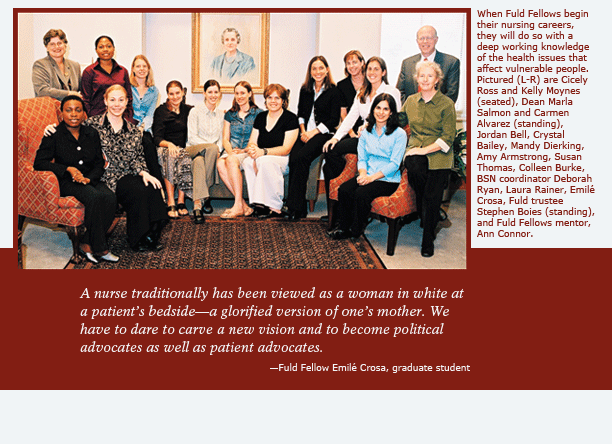 |
| |
|
|
|
|
|
|